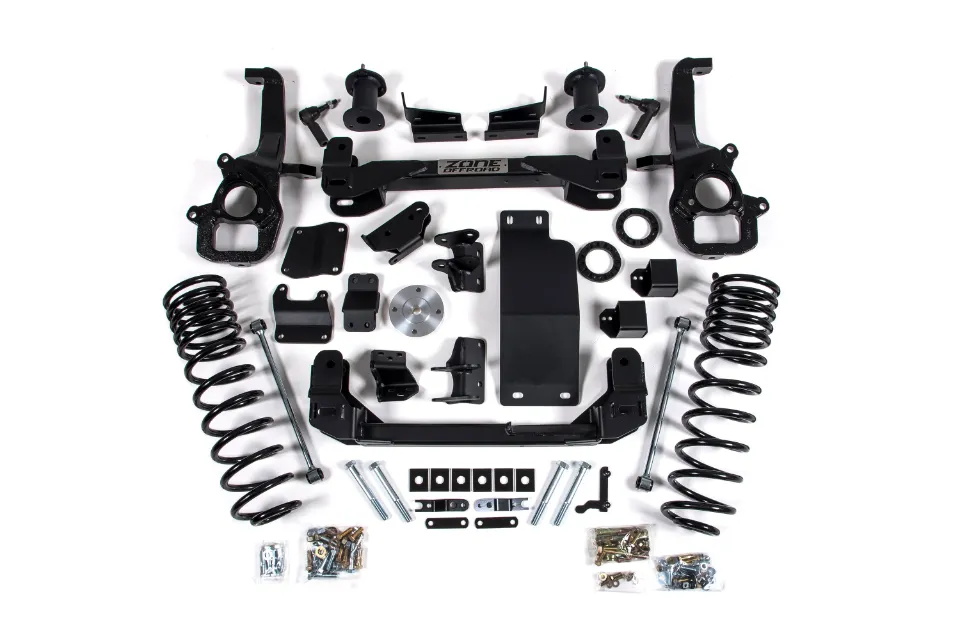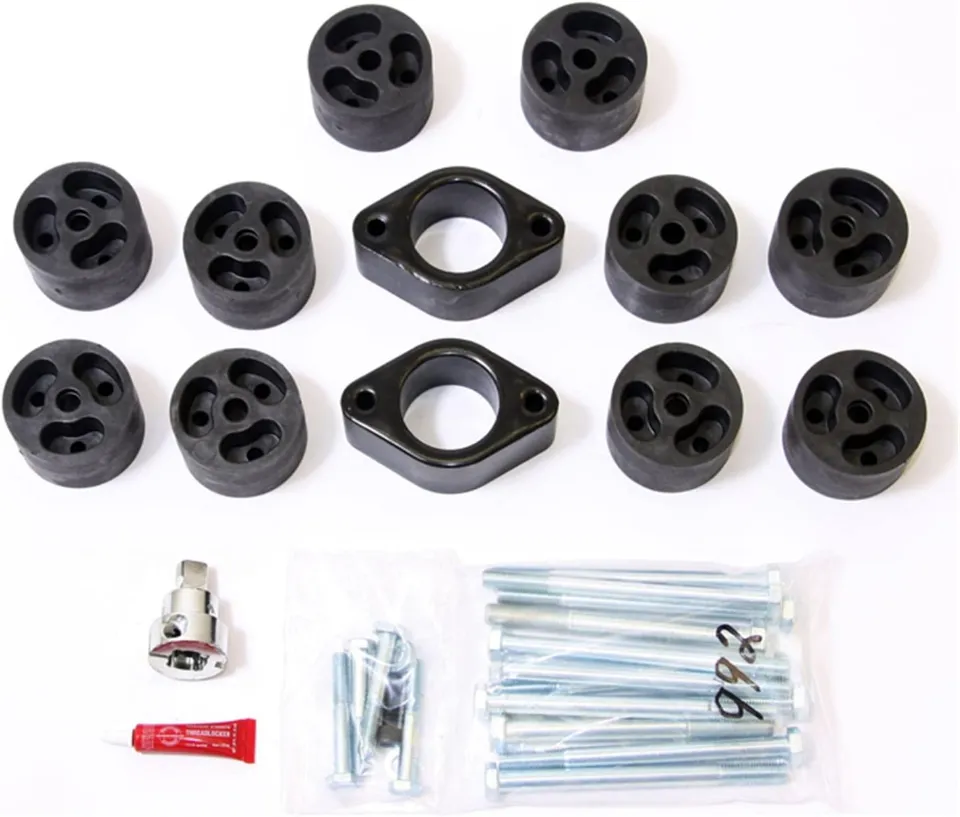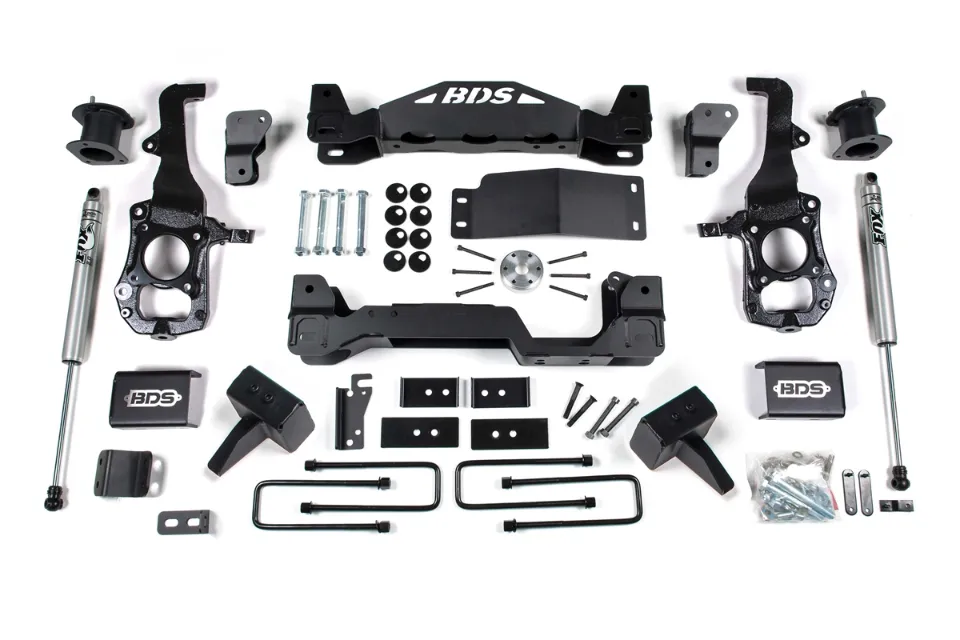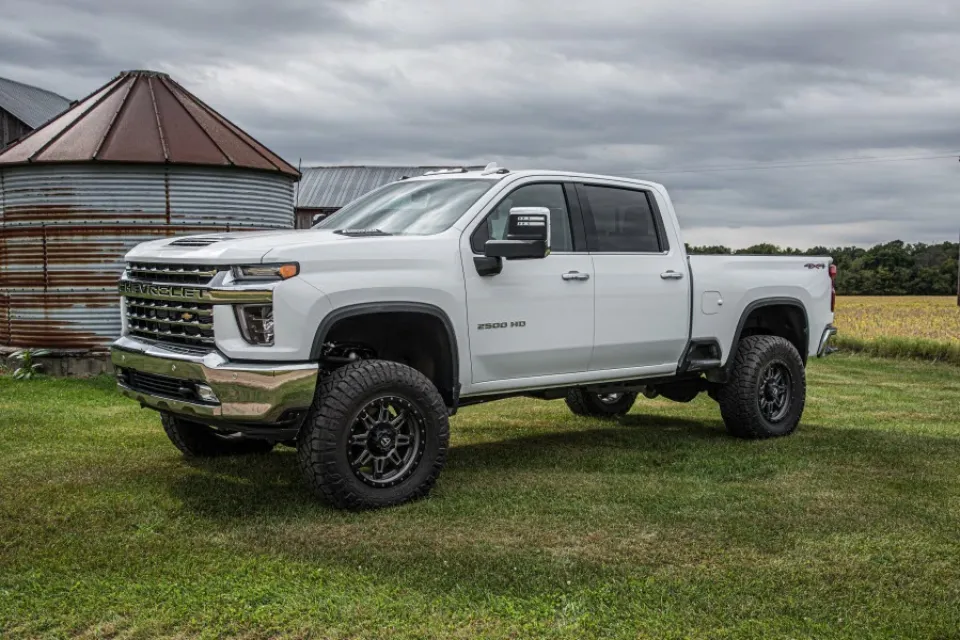
What is a Lift Kit? A Beginner’s Introduction
You have probably heard people that are passionate about trucks or SUV mention lift kits. You might have been curious about What is a Lift Kit, how does operate, and why would someone need one.
Lift kits are aftermarket components and accessories used to raise a vehicle higher off the ground. These are produced and installed by businesses that focus on producing extra parts for various vehicles, not by the vehicle manufacturer.
People used to frequently construct their own lift kits in the past, with varying degrees of success and safety. Nowadays, the majority of kits are produced by trustworthy companies that create the shape and size to fit particular vehicles, enhancing stability and safety.
Keep reading.
Table of Contents
What is a Lift Kit?
A lift kit increases the ground clearance between your truck or SUV and the road. How high your vehicle can sit depends on the kind of lift kit you use. Inches are separated between the body and the frame thanks to the body lift kit. You can choose how high you want your truck, SUV, or lifted Jeep to go by selecting a suspension lift kit.
What Do Lift Kits Do?
Lift kits achieve three goals:
- Provide separation. Increased distance between the axles and the vehicle body is produced by lift kits. They permit, for example, the fitting of larger wheels and tires to vehicles. A suspension lift kit also increases the ground clearance, or distance between the driving surface and the frame of the car. Off-road performance is improved by higher ground clearance.
- Enhance style. People who prefer the bulky appearance of a taller truck can give their vehicle a more fashionable appearance by installing a lift kit.
- Improve vision field. A vehicle can be lifted to give the driver a more powerful position. As a result, the driver’s field of vision is enhanced.

Body Lift Kits: Pros and Cons
The benefits and drawbacks of lift kits for your vehicle are listed below. To assist you in choosing to travel Glendale roads, we cover both body and suspension lift kits.
Pros of Body Lift Kits
A body lift kit could be a great choice for you for a number of reasons. Here are some pros to body lift kits:
- Lift kits are specially made not to alter the quality of how your truck drives
- Most lift kits are not too expensive
- Body lift kits are more economical than suspension lifts
- New shocks are not required for lift kits
- Body lift kits give tires more clearance while retaining the factory suspension and alignment for off-roading
Cons of Body Lift Kits
Body lift kits have many benefits, but like everything else, they also have drawbacks. Here are some of those body lift kit cons to consider:
- Installations require more time.
- The body is raised and bolted back into position.
- Greater visibility of the frame
- The factory bumpers are not raised along with the body.
- It does not offer performance advantages
- Can hinder performance

Suspension Lift Kits: Pros and Cons
For South Phoenix drivers who wish to add a suspension lift kit, here are its pros and cons:
Pros of Suspension Lift Kits
- instead of body lift kits that only allow for a few inches or less of lift, can lift a truck or an SUV as high as the driver desires.
- You can buy bigger tires.
- The suspension is clearly visible.
Cons of Suspension Lift Kits
- It can be difficult climbing in and out of a highly lifted Jeeps or trucks
- Not ideal for family vehicles
- A suspension lift kit needs some maintenance
- There can be a lot of cost for constant part replacements
- Suspension lift kits are more expensive
- It can void some warranties
- Your ride may not feel as smooth as before the lift kit

What Advantages Do Lift Kits Offer?
People who like to take their truck or SUV off-road frequently use lift kits because they can increase the clearance beneath a vehicle, which is their main benefit. With more suspension travel and wider angles, greater clearance not only makes it simpler to navigate challenging routes and get over bigger rocks, but it also makes room for larger wheels. Although these are specialized vehicles, an off-road truck that is used exclusively for off-roading can be outfitted in ludicrous ways.
Many people prefer having their car lifted higher off the ground so they can have a commanding view down at other drivers. They are also valuable in terms of aesthetics. Due to the fact that automobiles are not built to travel off-road, lift kits installed on them almost exclusively serve as a decorative accessory. Many drivers like to customize their vehicles with lift kits, even though not everyone likes the look of a car that has been raised up.
General Disadvantages
The potential for voiding a vehicle’s warranty is one of the main drawbacks of any kind of lift kit. Although it varies from manufacturer to manufacturer and is reliant on a warranty’s terms and conditions, this is not at all unusual. Because they alter a vehicle’s mechanical system, suspension lift kits in particular frequently void any applicable truck or SUV warranties.
Before having any kind of lift kit installed, there are also possible legal repercussions to think about. Bumpers, lights, and other parts of a vehicle are only permitted to be a certain height in certain states. Make sure you are aware of the maximum height your truck can be raised if you are thinking about using a lift kit on a vehicle that is not an off-road-only truck or Jeep. Ignoring this could lead to costly fines and tickets as well as catastrophic injuries if you collide with another car.
What to Check Out Before Buying a Lift Kit?
We think raising a truck is a good idea, especially for a particular use like off-roading. However, you may want to consider the following:
- Warranty: Your warranty could be voided if you make structural changes to a car. What affects the warranty and what doesn’t varies between manufacturers. If the warranty protections are crucial to you, speak with the manufacturer of your car to make sure the lift kit you’re thinking about won’t void the warranty.
- State Laws: Each state has its own set of driving laws. Make sure the bumper height won’t exceed the maximum permitted by law in your state before installing a lift kit.
- Insurance: As long as it stays within legal bounds, a lift kit shouldn’t raise your auto insurance premium. To pay for the cost of repairing or replacing aftermarket components in the event of an accident, theft, or natural disaster, you will likely need an insurance rider. Consult your insurance agent to be on the safe side.
- Garage: Raising the height of your car may prevent it from fitting in your garage or carport, unless you overnight store it in a barn or an airplane hangar.

FAQs
How Much Does a Lift Kit Cost?
The kind of kit and the amount of lift affect how much a lift kit costs. Usually costing between $200 and $500, a leveling kit raises only the front end. An inexpensive body lift kit costs between $150 and $300 and raises the body 1-3 inches off the frame. A suspension lift kit, which can raise the frame off the wheels by up to a foot, can cost thousands of dollars. The price increases as the height increases. Nevertheless, the typical 2-inch suspension lift kit ranges in price from $400 to $800.
Who Installs Lift Kits?
Lift kits are installed by specialty stores as an aftermarket product. The kits can frequently be installed where they were purchased. Search for lift kit installation to find nearby aftermarket specialty stores if you buy a kit from a retailer or online.
Is a Lift Kit Bad for a Truck?
Your new truck’s warranty may be nullified by a suspension lift kit. That serves as a grave caution. In actuality, though, a suspension lift kit, when installed correctly, can greatly increase your truck’s off-road capability. That a lift kit increases a truck’s wear and tear may be information you want to know. In addition to requiring more upkeep, suspension lift kits frequently degrade faster than the rest of the truck.
Is a Lift Right for You?
Simply put, lift kits are aftermarket accessories and tools used to raise a vehicle off the ground. These are produced and installed by businesses that specialize in producing extra parts for various vehicles, not by the manufacturer of the vehicle. With varying degrees of success and safety, people used to frequently rig up their own lift kits in the past. Nowadays, the majority of kits are produced by trustworthy companies that create the shape and size to fit particular vehicles, enhancing stability and safety.
The answer is probably yes if you are or want to be a serious off-roader. Or a lift kit is something to think about if your line of work requires you to travel through some rough terrain. Your car will have more ground clearance if you raise it by a few inches. All that extra wheel travel will come in handy when rock crawling if you mount some powerful, large tires.
If not, less is more.
The majority of drivers never leave the pavement, so the only reason to lift your car is for show: a slightly higher ride and slightly bigger wheels. Both a leveling kit and a body lift kit can help you do this.
Either option is less expensive than a suspension lift kit, requires less upkeep, has no impact on fuel efficiency, and doesn’t void your car’s warranty. Your car will still look sharp despite this. If you tow, a suspension lift kit won’t do anything to assist you in pulling a real load.
Please post a question in the comments if you have any. I appreciate your reading.

